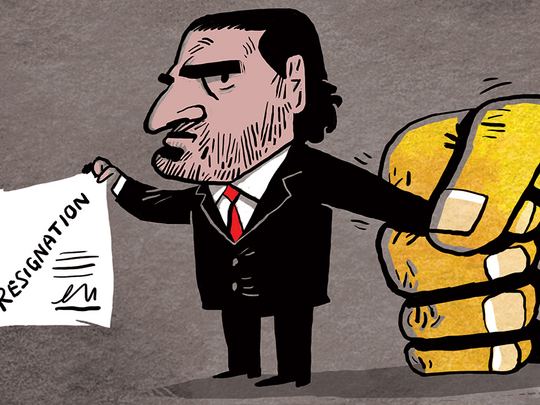
How not to remain a hostage in Hezbollah’s hands? Simply, follow the footsteps of Lebanon’s prime minister, Sa’ad Hariri. It took Hezbollah’s Lebanese leader, Hassan Nasrallah, two back-to-back speeches in one week, to successfully divert Lebanon’s public opinion away from the real reasons behind the country’s prime minister resignation on November 3.
Even some prominent leaders of Sa’ad Hariri’s own political group, the Future Party, clumsily fell in Nasrallah’s trap. The latter has skilfully made the call for Hariri to rescind his decision to resign, look like as if it was the major issue that threatened the country’s stability, and not the reasons behind. But fortunately, Hariri has come out fighting back and put the record straight in his live interview from his residence in the Saudi capital, Riyadh, last Sunday, explaining the circumstances that led to his resignation.
In fact, it is Nasrallah who fully undermined the long-awaited compromise, a year ago, with Hariri that saved Lebanon rapidly sliding into the region’s multiple wars, particularly in neighbouring Syria. This compromise, all observers agree, kept the country’s political texture protected following an unprecedented two-year period of uncertainty during which Lebanon’s seat of presidency was left deliberately vacant.
That presidential vacancy was fully the responsibility of Iran, using Hezbollah’s prominent parliamentarian and military power in the country, who adamantly rejected any other presidential candidate other than the current president, General Michel Aoun, the former leader and chairman of the powerful Maronite militia known as ‘Free Current’ (Al Tayyar al Hur). Tehran, as a rising and expanding power in the region, had previously refused Hariri’s recommendation for the presidency of Sulaiman Franjieh (MP), one of many Maronite militia leaders, publicly known for his alliance with Hezbollah and close friendship to neighbouring Syria’s Al Assad family.
However, Hariri realised that Hezbollah was continuously leading the country away from the nature of the compromise he thought he had reached with Nasrallah a year ago, to rebuild its economy and maintain whatever left of Lebanon’s neutrality, or what is locally known in the Lebanese jargon as ‘to keep to oneself’. But soon it was made bluntly clear by Nasrallah himself that Hezbollah was merely an extension of Tehran’s regional policy. Almost in all his well-organised speeches, Nasrallah has never shied away from this fact. He keeps repeating publicly “how proud he is” to be a leader of a party which assertively functions under the leadership of ‘Wilayet Al Faqih’ (the Rule of Jurist), as represented by Iran’s spiritual leader, Ayatollah Ali Khamenei.
Nasrallah has obviously broken the conditions upon which Hariri’s government was able to be born. Lebanon has, since its independence in 1944, been based on clear balance of power where its head of state is a Christian Maronite, its Parliament Speaker is Shiite and prime minister a Sunni. The country’s governing various institutions and key state jobs, including the legislative seats, are divided in a partnership according to the numbers of each sects’ population. Lebanon had unfortunately driven itself into a 15-year long civil war in 1975, only to be ended by signing what has become commonly known as the ‘Taif Agreement’ (The National Accord Document) in Saudi Arabia by Lebanon’s MPs in 1989. The Taif Agreement stipulated that the country’s 128 parliamentary seats be equally divided between Christians and Muslims, and proportionately shared between the denominations of each sect.
Weaker element
The problem is with Hezbollah which has been using its partnership with the Sunni prime minister as a legal cover for its active role in support of Iran’s regional policy. Nasrallah has sent his militia out to Syria since 2015 to shore up Al Assad’s dwindling power in the country. Hezbollah’s military power in Lebanon has been expanded to the extent that it has, according to some estimates, become quadruple that of the state’s regular army. It is practically now ‘a state within the state’ which has the ability to effectively influence the formal decisions by the sovereign state. Hariri knows extremely well that he represents the weaker element in any agreement with Nasrallah when it comes to arms and money. Furthermore, Hezbollah could successfully muster a comfortable coalition majority in the parliament sufficient enough for Nasrallah to remain in control of the decision-making process.
Nasrallah’s position after Hariri’s resignation was precarious to say the least. The resignation has simply lifted the legal cover that provided Hezbollah with the necessary protection for five years, the duration of the government’s normal length. But what is totally peculiar is President Aoun’s position, who found himself deeply and publicly engaged in the timing of Hariri’s return to Beirut and indirectly accused the Saudis of secretly conniving with Hariri, instead of seriously looking behind the real reasons that led to the resignation.
However, Aoun had to accept Hezbollah’s offer. He is now in debt to Nasrallah, and in an extension to Iran, that paved the way for him to Ba’abda’s Palace. Hariri may have erred in accepting the compromise with Nasrallah that led to forming a government a year ago, but he strongly proved, by resigning, that he totally rejects remaining a hostage in the hands of Hezbollah.
Mustapha Karkouti is a columnist and former president of the Foreign Press Association, London. You can follow him on Twitter @mustaphatache.









